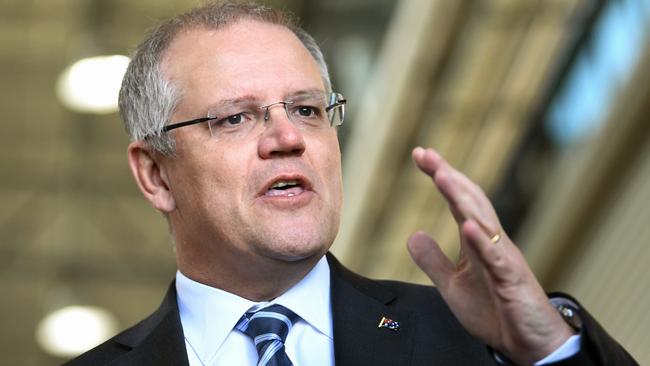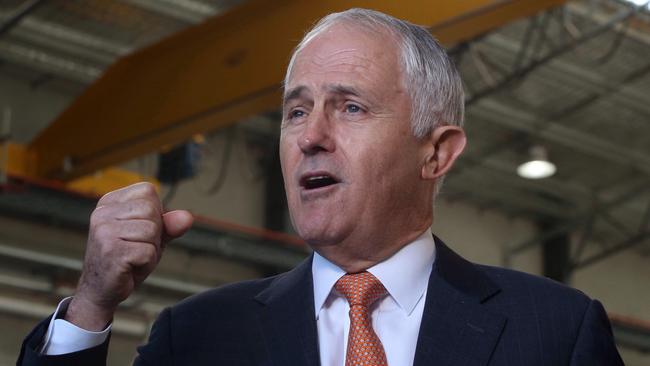Scott Pape on Scott Morrison and how first home buyers can crack into Australia's property market
DEEP down, Treasurer Scott Morrison knows he can’t really fix anything, especially the housing market, writes Scott Pape.

Barefoot Investor
Don't miss out on the headlines from Barefoot Investor. Followed categories will be added to My News.
’WAAAH!” wailed my son.
Tragedy had struck: our golden retriever had used his favourite toy tractor as a makeshift bone.
“Dad ... can you fix it?”
I looked at my distraught son.
I looked at the mangled remains of his little John Deere toy tractor, covered in bite marks, missing two wheels, and encased in a film of dog slobber.
“You can fix anything ... right Dad?”
“Oh ... umm ... sure,” I mumbled, avoiding eye contact with son number one.

HELLO, MR FIX-IT
A THOUSAND kilometres away another Scott (Morrison, the Federal Treasurer) was having his own chewed-up screwed-up moment: right now millions of kids are asking the Treasurer ... “Please Mister Sco-Mo, can you fix the housing market for us?”
Like me, deep down Sco-Mo knows he can’t really fix anything.
Like me, he also knows no one wants to hear that ... so he’s just trying to keep everyone happy (and keep his job).
Still, he and Malcolm-in-the-Middle have only themselves to blame for the political pickle they’re in. After all, they were the ones who boldly declared that the centrepiece of next month’s Federal Budget would be policies to fix the mangled mess that is housing affordability.
And, just like my son, first homebuyers are now staring at Sco-Mo expectantly. A good example of which was the headline this week: “Government aiming to fix housing deposit problem so young buyers can purchase ‘as soon as possible’.”
(No pressure, Sco-Mo!)
And so the pre-Budget tradition of leaking ideas to the media to see what sticks or stinks is in full swing.

The big idea that has had more leaks than the Titanic is allowing first homebuyers to raid a few years of their super contributions to build a deposit. This week the Treasurer again refused to rule out the idea. Though in this he’s at odds with his boss, who described it in 2015 as a “thoroughly bad idea”.
And as I go to print, the Prime Minister appears to have put his foot down (though with Malcolm that would be a gentle tap of his $800 brogues) and said it won’t happen.
In reality, their hands are tied.
The Government doesn’t have the political ticker to touch negative gearing, despite the fact that the rules favour investors over homebuyers and encourage loss-making property speculation.
(Research from Digital Finance Analytics this month shows that one in three Sydney landlords risks being under financial stress should rents fall or rates rise. History shows that, when a downturn occurs, property investors often rush to sell — unlike owner-occupiers, many of whom would sell the dog to keep their family home.)
And while the Government is making noises about trying to encourage oldies to downsize, they don’t have the kahunas to include the primary residence in the asset test for the Age Pension.

CANBERRA CAN’T SOLVE A DAMN THING
LOOK, I’m no Rhodes scholar (like, say, Tony Abbott, who incidentally is a big fan of raiding super), but the only sustainable ‘fix’ for housing affordability is lower property prices.
And it’ll happen anyway at some stage.
Fact is, Australia’s household debt is out of control. Our household debt-to-gross domestic product ratio sits at 123 per cent — the third highest in the developed world, and much higher than the Poms (88 per cent) and the Yanks (79 per cent), and basically twice as much as the Greeks (62 per cent)!
So, as I’ve said many times before, we’ve got debts at all-time record highs when interest rates are at all-time record lows.
When interest rates rise — and they will, eventually — house prices will fall, and housing affordability will be fixed (Yay!). The only problem is, you may not have a job as we slide into recession (Boo!).
But don’t expect anyone in Canberra to talk about this.
Even though they’re chauffeured around in fancy cars with little flags on the bonnet, that doesn’t mean they know what’s going on ... or that they’ll admit how worried they really are.
Heck, even the people who set interest rates don’t have much of an idea. Case in point: at the height of the US housing boom, then Federal Reserve chairman Ben Bernanke was interviewed on TV:
Interviewer: “Tell me, what’s the worst-case scenario? Sir, we have so many economists coming on air and saying, ‘Oh, this is a bubble, and it’s going to burst, and this is going to be a real issue for the economy.’ Some say it could even cause a recession at some point. What is the worst-case scenario, if in fact we were to see prices come down substantially across the country?”
Bernanke: “Well, I guess I don’t buy your premise. It’s a pretty unlikely possibility. We’ve never had a decline in house prices on a nationwide basis. So what I think is more likely is that house prices will slow ... maybe stabilise.”
The US housing bust triggered the deepest financial crisis in living memory. Yet here’s the interesting thing: the beginnings of the US housing bubble can be traced back to 1995, when then president Bill Clinton passed legislation to ... tackle housing affordability.
So the lesson here is simple: don’t look to anyone — except yourself — to fix your problems. After all, this Scott has enough of his own.
“Waaaah!”
Tread Your Own Path!
Read more Barefoot:
Knowledge is key to dodging a financial bullet
Scott Pape on why he rarely tells people to sell family homes


